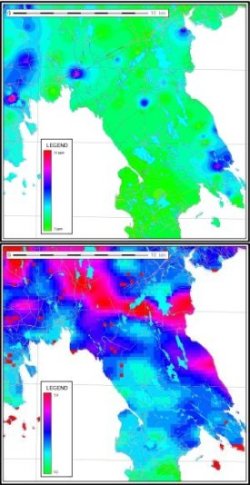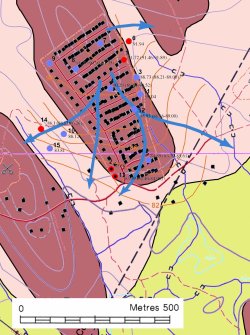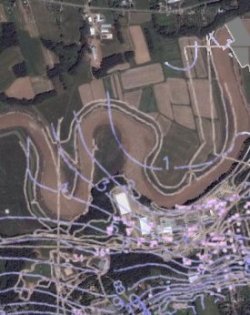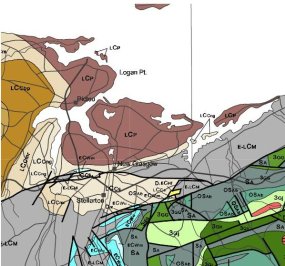Mill Cove groundwater supply
The Municipality of the District of Chester hired earth-water Concepts inc. to conduct a regional groundwater study of the Aspotogan Peninsula, Nova Scotia. The purpose of the study was to evaluate options to improve an existing groundwater supply so it could meet new water quality standards, to investigate water resource potential to replace or augment the existing groundwater supply, to do preliminary groundwater exploration to help confirm the assessment study results, and to evaluate the ability of a new potential groundwater supply to sustain population growth at Mill Cove, located on the peninsula.
 The peninsula has a thin soil veneer that is underlain
almost entirely
by granite where fracture flow is predominant. Residential well yields
vary, but were found to average less than 2 US gpm. Mill Cove is a
former military
base that is now in municipal hands and was under consideration for
private development. The former base obtained its water from a nearby
lake that, due to the high cost for treatment, was replaced by a
groundwater source that consisted of a single high-production well.
The production rate for that well was a anomaly, in that the well had
been located based solely on its proximity to the existing water
treatment facility.
The peninsula has a thin soil veneer that is underlain
almost entirely
by granite where fracture flow is predominant. Residential well yields
vary, but were found to average less than 2 US gpm. Mill Cove is a
former military
base that is now in municipal hands and was under consideration for
private development. The former base obtained its water from a nearby
lake that, due to the high cost for treatment, was replaced by a
groundwater source that consisted of a single high-production well.
The production rate for that well was a anomaly, in that the well had
been located based solely on its proximity to the existing water
treatment facility.
The existing water supply well was thought to be a possible GUDI well (groundwater under direct influence of surface water), which the province no longer allows for municipal use without the application of costly surface-water type treatment systems. The well also produced fluoride in concentrations that were above the drinking water guideline levels.
earth-water Concepts inc. performed a comprehensive site geologic and groundwater investigation that included:
Valley Gate water supply
The Valley Gate Mobile Home Park, which is underlain by metamorphosed greywacke and slates of the Cambrian-Ordovician age Meguma Group in central Nova Scotia, services about 200 homes from a private groundwater source. earth-water Concepts inc. was hired by park management in response to requests by the province for the client to obtain a groundwater withdrawal permit application.
A detailed study was carried out that included water quality reviews, pumping tests on existing wells, and reviews of historic and current water demands to evaluate the ability of the existing water supply to sustain long-term growth at the park.
The assessment found that the existing supply wells could not adequately meet the existing or the long-term demand, nor could it satisfy existing water quality requirements. Therefore, a groundwater exploration program was launched that involved extensive geological field mapping, followed by successful drilling for new groundwater supply, pumping tests, client training in the management of the new water supply, preparation of necessary technical documentation and submission of an application for permitting of a supply that could meet long-term demand and quality needs.
The Municipality of the District of Chester hired earth-water Concepts inc. to conduct a regional groundwater study of the Aspotogan Peninsula, Nova Scotia. The purpose of the study was to evaluate options to improve an existing groundwater supply so it could meet new water quality standards, to investigate water resource potential to replace or augment the existing groundwater supply, to do preliminary groundwater exploration to help confirm the assessment study results, and to evaluate the ability of a new potential groundwater supply to sustain population growth at Mill Cove, located on the peninsula.
 The peninsula has a thin soil veneer that is underlain
almost entirely
by granite where fracture flow is predominant. Residential well yields
vary, but were found to average less than 2 US gpm. Mill Cove is a
former military
base that is now in municipal hands and was under consideration for
private development. The former base obtained its water from a nearby
lake that, due to the high cost for treatment, was replaced by a
groundwater source that consisted of a single high-production well.
The production rate for that well was a anomaly, in that the well had
been located based solely on its proximity to the existing water
treatment facility.
The peninsula has a thin soil veneer that is underlain
almost entirely
by granite where fracture flow is predominant. Residential well yields
vary, but were found to average less than 2 US gpm. Mill Cove is a
former military
base that is now in municipal hands and was under consideration for
private development. The former base obtained its water from a nearby
lake that, due to the high cost for treatment, was replaced by a
groundwater source that consisted of a single high-production well.
The production rate for that well was a anomaly, in that the well had
been located based solely on its proximity to the existing water
treatment facility.The existing water supply well was thought to be a possible GUDI well (groundwater under direct influence of surface water), which the province no longer allows for municipal use without the application of costly surface-water type treatment systems. The well also produced fluoride in concentrations that were above the drinking water guideline levels.
earth-water Concepts inc. performed a comprehensive site geologic and groundwater investigation that included:
- a review of all water quality results from the former base water supply sources and from a number of nearby residential wells,
- a review of all available regional residential well construction and pumping test data,
- terrain and lineament analysis of the peninsula and of parts of the mainland based on air photos, from digital elevation models, and from multiple shaded relief surfaces,
- review and assimilation on GIS of all available stream geochemistry data, soil geochemistry data, and relevant airborne geophysical surveys, along with all available well data,
- drilling and pumping test evaluations on a number of exploration wells drilled to match and/or exceed the existing supply well total water production capability.
Valley Gate water supply
The Valley Gate Mobile Home Park, which is underlain by metamorphosed greywacke and slates of the Cambrian-Ordovician age Meguma Group in central Nova Scotia, services about 200 homes from a private groundwater source. earth-water Concepts inc. was hired by park management in response to requests by the province for the client to obtain a groundwater withdrawal permit application.

A detailed study was carried out that included water quality reviews, pumping tests on existing wells, and reviews of historic and current water demands to evaluate the ability of the existing water supply to sustain long-term growth at the park.
The assessment found that the existing supply wells could not adequately meet the existing or the long-term demand, nor could it satisfy existing water quality requirements. Therefore, a groundwater exploration program was launched that involved extensive geological field mapping, followed by successful drilling for new groundwater supply, pumping tests, client training in the management of the new water supply, preparation of necessary technical documentation and submission of an application for permitting of a supply that could meet long-term demand and quality needs.
Frito-Lay water supply
Frito-Lay Canada and ACA Co-Operative Ltd. hired earth-water Concepts inc. to help address water supply concerns at two adjacent food processing plants located in New Minas, Nova Scotia. Central town water is available to the two food manufacturers, but to help reduce water supply costs, both plants have continued to rely on on-site wells to satisfy a large percentage of their total water supply demand.
The wells on the two food production plant sites were drilled into a confined, relatively highly permeable but poorly indurated Triassic sandstone aquifer. These sedimentary deposits pinch out a short distance upgradient of the two food processing plants, where the Triassic sediments onlap unconformably onto the Cambrian aged, metamorphosed sedimentary basement bedrock complex. Groundwater flow within the basement complex is limited to secondary (fracture flow) permeability.
 The
pinching out of the Triassic sedimentary unit has resulted in a
limitation boundary for the aquifer that had gone unnoticed due to poor
interpretation of pumping tests done much earlier by others. As a
result, the existing wells at both food production plants were over
pumped. This resulted in a significant lowering of groundwater levels
in the confined aquifer, and severe borehole erosion at some of the
water production wells.
The
pinching out of the Triassic sedimentary unit has resulted in a
limitation boundary for the aquifer that had gone unnoticed due to poor
interpretation of pumping tests done much earlier by others. As a
result, the existing wells at both food production plants were over
pumped. This resulted in a significant lowering of groundwater levels
in the confined aquifer, and severe borehole erosion at some of the
water production wells.
earth-water Concepts inc. undertook an extensive hydrogeological review of the area with the goal of adding new wells at both sites to help increase overall on-site production capability while also relieving water level stresses at the existing water production wells. The program included:
Pictou County community supply
The Municipality of Pictou County hired earth-water Concepts inc. to do a regional groundwater study involving several watersheds on the northern mainland of Nova Scotia. The aim of the study was to investigate the ability of Carboniferous sandstone and conglomerate deposits of the Cumberland and Mabou Groups to support commercial and municipal water demand in the east and west New Glasgow areas, to evaluate the potential for water quality risks in the respective aquifers relating to various existing commercial and municipal land uses, and to undertake preliminary groundwater exploration and pumping test work to verify the results of the assessment.

earth-water Concepts inc. performed a comprehensive investigation that:
Frito-Lay Canada and ACA Co-Operative Ltd. hired earth-water Concepts inc. to help address water supply concerns at two adjacent food processing plants located in New Minas, Nova Scotia. Central town water is available to the two food manufacturers, but to help reduce water supply costs, both plants have continued to rely on on-site wells to satisfy a large percentage of their total water supply demand.
The wells on the two food production plant sites were drilled into a confined, relatively highly permeable but poorly indurated Triassic sandstone aquifer. These sedimentary deposits pinch out a short distance upgradient of the two food processing plants, where the Triassic sediments onlap unconformably onto the Cambrian aged, metamorphosed sedimentary basement bedrock complex. Groundwater flow within the basement complex is limited to secondary (fracture flow) permeability.
 The
pinching out of the Triassic sedimentary unit has resulted in a
limitation boundary for the aquifer that had gone unnoticed due to poor
interpretation of pumping tests done much earlier by others. As a
result, the existing wells at both food production plants were over
pumped. This resulted in a significant lowering of groundwater levels
in the confined aquifer, and severe borehole erosion at some of the
water production wells.
The
pinching out of the Triassic sedimentary unit has resulted in a
limitation boundary for the aquifer that had gone unnoticed due to poor
interpretation of pumping tests done much earlier by others. As a
result, the existing wells at both food production plants were over
pumped. This resulted in a significant lowering of groundwater levels
in the confined aquifer, and severe borehole erosion at some of the
water production wells.earth-water Concepts inc. undertook an extensive hydrogeological review of the area with the goal of adding new wells at both sites to help increase overall on-site production capability while also relieving water level stresses at the existing water production wells. The program included:
- an in-depth desktop study of the regional and local area geology and hydrogeology,
- video logging of the existing water supply wells to assess well condition and to log borehole geology,
- the drilling (with proper logging) of new water supply wells,
- a pumping test program of all existing and new wells,
- reconstruction of the wells that were subjected to borehole
erosion due to the use of oversized pumps,
- consultation and reconsideration of the existing production wells as a single well field, and design of a pumping schedule for the field that could ensure sustainability of supply and as wells as equitable distribution of water for both food processing plants, and
- preparation of the supporting documentation needed to obtain water withdrawal approvals for the new well field.
Pictou County community supply
The Municipality of Pictou County hired earth-water Concepts inc. to do a regional groundwater study involving several watersheds on the northern mainland of Nova Scotia. The aim of the study was to investigate the ability of Carboniferous sandstone and conglomerate deposits of the Cumberland and Mabou Groups to support commercial and municipal water demand in the east and west New Glasgow areas, to evaluate the potential for water quality risks in the respective aquifers relating to various existing commercial and municipal land uses, and to undertake preliminary groundwater exploration and pumping test work to verify the results of the assessment.

earth-water Concepts inc. performed a comprehensive investigation that:
- characterized possible commercial water demands from various potential aquifers,
- defined water balances and total water availability via watershed assessment for groundwater recharge,
- evaluated each of several geologic units for their potential to serve as possible commercial/municipal aquifers,
- evaluated local yield for candidate aquifers under current and future demand conditions,
- described the local and regional effects of groundwater withdrawal in the area,
- identified possible water sources and evaluated the risks of contamination for candidate aquifers,
- defined optimum aquifer protection prospects and likely exploration drilling targets,
- involved the local community where there was greatest potential
for exploration drilling, and
- defined the physical, hydrologic and hydrochemical characteristics of selected aquifers through drilling and pump testing programs.




